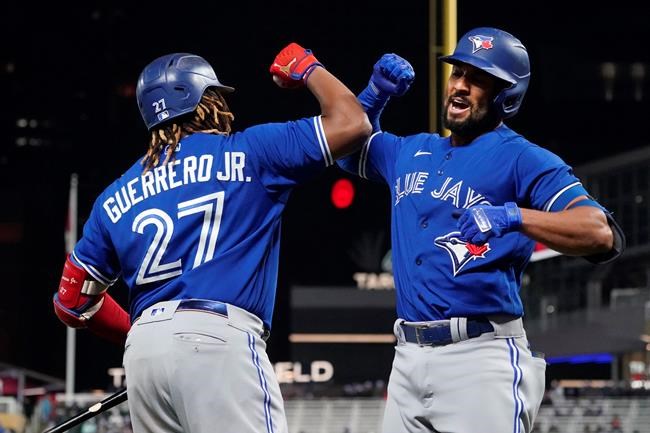MLB, players reach deal to end lockout

Posted March 10, 2022 1:27 pm.
Last Updated March 10, 2022 3:29 pm.
Major League Baseball and the players union reached a deal Thursday on a new collective bargaining agreement that will effectively end the lockout after ratification.
Players vote yes, source confirms to me and @ShiDavidi
Baseball is coming back
— Ben Nicholson-Smith (@bnicholsonsmith) March 10, 2022
The two sides hammered out a deal after marathon sessions this week, avoiding losing regular-season games caused by labour strife for the first time since 1994-95.
The league had previously cancelled games through April 13 when they couldn’t reach a deal on Wednesday.
The Athletic reported that MLB had set a Tuesday deadline for an agreement to be reached and still salvage a full 162-game season, though that was pushed back as the parties tried to reach a deal.
ESPN’s Jeff Passan previously reported that if a deal had been struck Tuesday, players could report to camps as early as Friday and previously cancelled games – commissioner Rob Manfred last week cancelled the first two series of the season – could be made up on off-days and with double-headers.
A proposal from MLB Tuesday evening included significant increases to the competitive-balance tax and the pre-arbitration bonus pool, as well as smaller-scale concessions in other areas. Those developments led to initial optimism that there could be a path to a deal on time to play a 162-game season for which players would be paid in full.
During talks in New York, the prospect of an international draft became a focal point of discussions and talks slowed, according to sources. While the league now considers an international draft a priority, players had some initial resistance to the idea, meeting internally to discuss potential consequences in detail while reaching out to Latin American players for additional viewpoints.
Both sides made significant concessions during the course of talks, which were led by MLB’s Dan Halem and the MLBPA’s Bruce Meyer.
The league proposed a competitive balance tax of $230 million (up from $220 million) with increases to $242 million over the course of a five-year CBA. Players, meanwhile, expressed openness to a new surcharge tax level designed to rein in runaway spenders.
The league also offered to increase the bonus pool for pre-arbitration eligible players to $40 million annually, up from $30 million. The players didn’t initially present the league with a formal counter-offer on that topic, but indicated a willingness to lower their ask from $80 million per year down to $70 million with annual increases.
Owners also increased their offer on minimum salaries slightly while offering to determine a sixth draft pick via lottery, as the players had requested. Meanwhile, the players offered to allow MLB to implement rule changes regarding shifts, expanded bases and pitch clocks with 45 days’ notice.
Negotiations intensified in March after the league and players met just six times on core economics during the first 2 1/2 months of the lockout. Both sides laid out their positions to each other in detail, both agreeing to funnel more money to young players and, despite early stalemates, were able to bring gaps on many economic terms to get a deal done.
Players stood to lose $20.5 million in salary for each day of the season that was cancelled, according to a study by The Associated Press, and the 30 teams stood to lose large sums that were harder to quantify.
Baseball’s ninth work stoppage — and first since 1995 — originally led to preseason games being cancelled through March 18.
The most contentious proposals in dispute were luxury tax thresholds and rates, the size of a new bonus pool for pre-arbitration players, minimum salaries, salary arbitration eligibility and the union’s desire to change the club revenue-sharing formula.
In addition, MLB tied the elimination of direct free-agent compensation to players agreeing to higher luxury tax rates and wanted to expand the playoffs to 14 teams rather than the union’s preference for 12.
– With files from Ben Nicholson-Smith and The Associated Press








